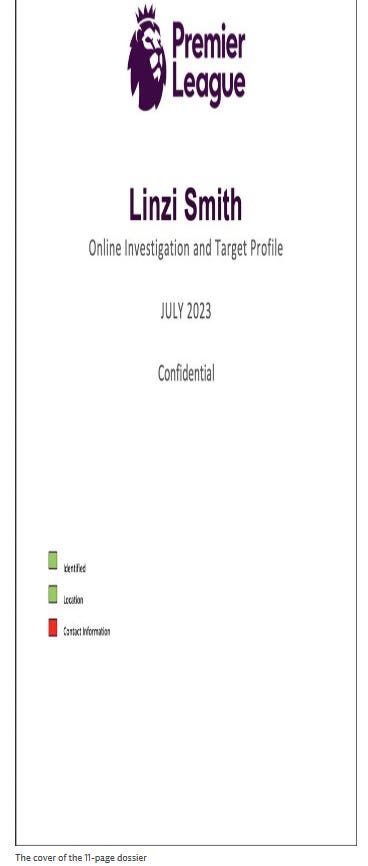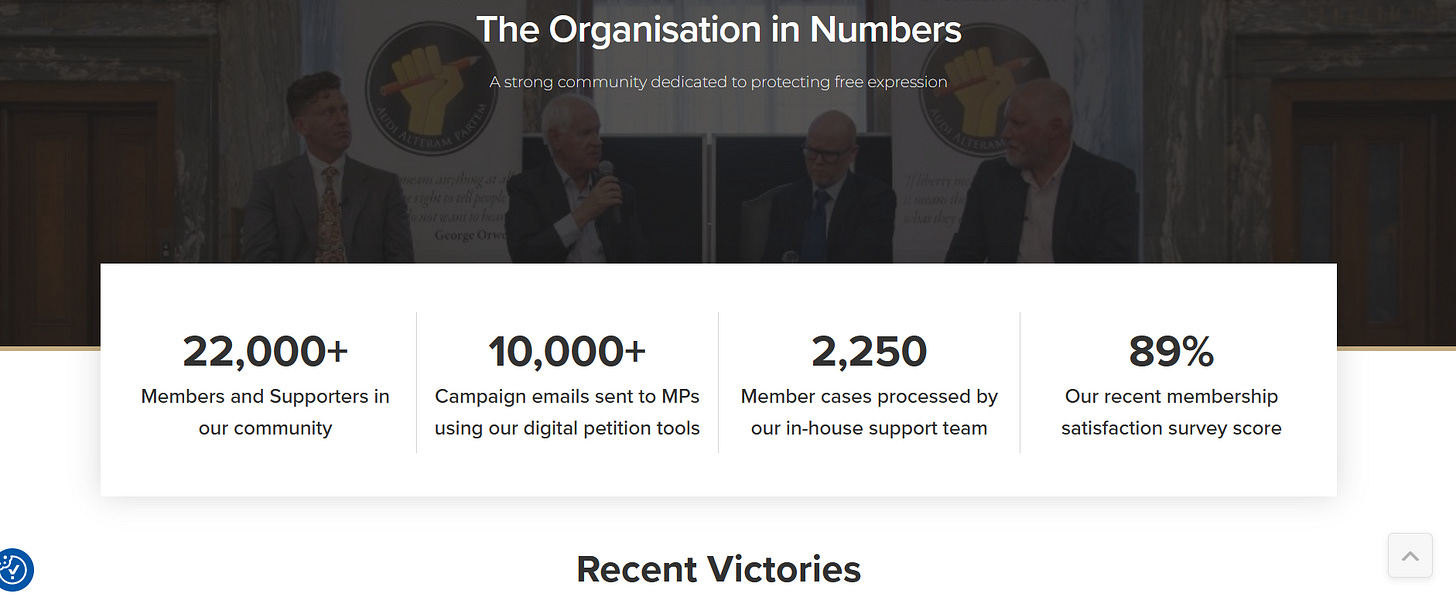Role Reversal
How the Free Speech Union's latest case shows how the realignment is making Britain topsy-turvy
I was planning to write about President Joe Biden this weekend, but a recent case being taken up by the Free Speech Union tickled my interest.
Come back next week for Biden-related thoughts!
What’s the case?
The details are set out on the FSU’s website, and have also been reported in the Telegraph (paywalled) and the Daily Mail (unpaywalled). In short, a Newcastle United fan, Linzi Smith (34) has received a multi-year ban for various gender critical1 remarks she made on social media - even though there is no suggestion that any of this abuse was made at games or directed at players - and no crime has been committed. The fan, who is a lesbian, is challenging the club on the grounds that as gender critical beliefs are protected by law, the club’s actions constitute discrimination.
So far so (depressingly) normal. Given there is now a well-established series of cases showing that discriminating against someone for gender critical views is illegal2 (and that the FSU has a track record of doing well in this area), it would appear she may well have a decent chance of success. I wish her well.
What’s particularly interesting - and concerning - about this case is that it is reported that the Premier League has been maintaining an ‘investigation unit’ to investigate wrong-think amongst fans. In this case, at Newcastle United’s request compiled an 11-page dossier on Ms. Smith to inform the decision. The dossier, obtained by Ms Smith via a Subject Access Request, allegedly contains details of where she lives, works, walks her dog, and detailed records of her social media statements - none of which, it is worth emphasising, were against the law.
A topsy-turvy world
This is not about whether or not one agrees with Ms Smith, or whether her remarks were true, or accurate, or even particularly nice - it may well be that they were not - but whether or not one thinks that large corporate entities should be conducting social media monitoring exercises on members of the public in order to act against them.
In the past, it was generally the case that (small c) conservative forces dominated the institutions, and individuals with left-wing or progressive views were the subject of suspicion. Both MI5 and the FBI infiltrated and attempted to disrupt trade unions, gay people faced massive discrimination, universities sacked star academics for getting a divorce and companies would fire ‘trouble-makers’ or ‘ring-leaders’ even if they didn’t actually have a legitimate reason to do. To protect themselves, those on the left would join together in trade unions for protection and mutual support - because even when the law in theory gave people rights, often they would need the support of others to enforce it.
In today’s world that’s been turned upside down. What counts as ‘right’ and ‘left’ is increasingly confusing, as people identify on social and cultural lines as much as economic, with education (and age) far more important determinants than class. To take this specific example, many leading figures in the gender critical movement identify as left-wing - but gender critical views are anathema to the modern identitarian progressive movement which prioritises issues of race, gender and sexuality.
The Realignment can be overstated. To some extent, the right remains the party of lower taxes and lower public spending, and the left the opposite. But whether it is Anne Widdecombe being cheered in northern mining towns, the Labour party campaigning for priority vaccinations for teachers (but not for retail or delivery workers), the right at odds with big business over Brexit, or Labour campaigning against ‘twenty-five Tory tax rises’, it’s clear that we’re not in Kansas any more.
What is certain is that the institutions - professional bodies, universities, large corporations, the public sector, big business and - as we have seen - big sports clubs - are dominated by these progressive voices, who often exert particular sway over HR and related areas. Nor can people who dissent from progressive orthodoxy count on support from traditional trade unions: these have, for the most part, been captured by the identitarians and I would be very cautious about relying on one for support in any dispute where you were on the ‘wrong’ side of one of the ‘hierarchy of privilege’3. In academia, certainly, the University and College Union has more often been on the side of those trying to force out gender critical academics than on the side of the academics being cancelled.
And so we come full circle. Just as in times gone by, the ‘trouble-makers’ banded together to form their own organisations of mutual support, today we see the same things with new organisations such as the FSU springing up to defend those accused of ‘wrong-think’ and who may be losing their livelihoods - or even just their club membership - for it.
And finally…a bit more about the Free Speech Union
Full disclaimer here: I’m a member of the FSU and - obviously - support their work, but I was not asked to write this piece (and nor have I received anything for doing so).
Though not a trade union, the FSU is a genuine union: it is funded through member subscriptions and primarily exists to support those members. At times that consists of simply writing a stern legal letter; at other times they’ve taken cases to court.
And they have a strong track record of winning. Recent victories include securing a six-figure settlement for a Department for Work and Pensions employee sacked for challenging whether or not critical race theory and gender ideology being espoused in the work place contravened civil service impartiality rules and securing nearly half a million pounds for a Barclays Bank employee summarily dismissed for mentioning the n-word during a training session.
These sort of cases are critical for changing behaviour on a wider scale. Though tribunal cases do not formally set precedent, they will be carefully looked at throughout the employment law world. Most corporate CEOs are not themselves ‘woke’: they may have been complaisant about activists taking over staff networks and HR when they thought it was harmless activity that helped to keep up staff morale, but most will but a stop to it sharply enough if they believe it will result in their company having to make six-figure pay-outs.
For the times when the current law is not enough, the FSU also actively campaigns for changes to the law to support free speech - and against proposed changes that would curtail it. They are non-partisan and have been highly critical of the current Conservative government at times - for example over the Online Safety Act - though have welcomed measures the Government has taken, such as the Higher Education (Freedom of Speech) Act.
Though trade unions have their pros and cons, the work that unions do to support individual members whose rights have been abused by the powerful has always been one of the most unambiguously positive elements of their work. Those of us who grew up in the ‘90s and ‘00s - the era between hegemonies, when the old orthodoxies had faded but the new had not yet become established - can it find it hard to intuitively grasp the level of conformity demanded by a hegemonic belief system - and the seemingly disproportionate penalties that can be levied at those who dare to transgress it. One always thinks, ‘it couldn’t happen to me’ - until it does.
If you hold any views that are at odds with those of progressive orthodoxy4, the Free Speech Union offers a genuine measure of protection and reassurance at a very small cost. Rather as one might have previously joined a traditional trade union to defend oneself in a case of wrongful dismissal, membership here offers similar protection. And, just like a regular union, if - as one hopes - one never needs its services, one can take comfort in the knowledge that one’s union dues have gone to support those who faced less fortunate circumstances, and to promote wider values of free expression upon which society depends. If you’ve ever thought, ‘that could be me’ - or even if you haven’t - I would encourage you to consider signing up.
Gender critical beliefs refer to the set of beliefs that hold that biological sex is real, cannot be changed and that in at least some circumstances it is more significant than a person’s self-identified ‘gender’ in terms of what rights a person should have - for example which category they should compete in in a sport, or whether they should be allowed access to female-only spaces such as women’s refuge centres.
I.e. male in any accusation of sexual harassment or discrimination; white in any case involving an allegation of racism, etc.
And bear in mind just how fast those norms can change in today’s 24-hour internet-enabled world.





Another topsy-turvy aspect to the story: https://news.sky.com/story/newcastle-united-takeover-who-are-the-new-owners-of-the-tyneside-club-12429090. Thank goodness I support Sunderland...